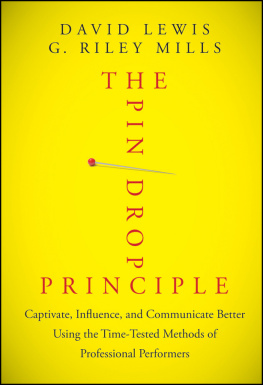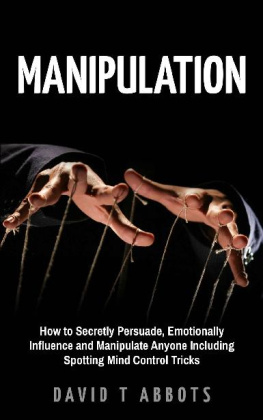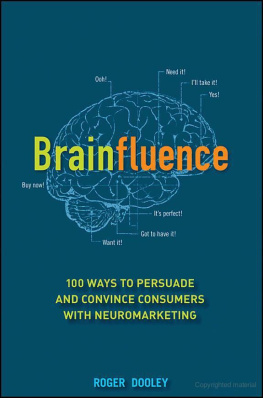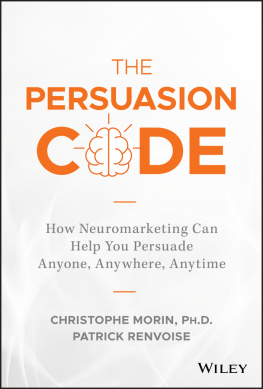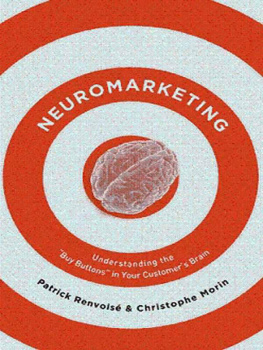David Lewis - The Brain Sell: When Science Meets Shopping
Here you can read online David Lewis - The Brain Sell: When Science Meets Shopping full text of the book (entire story) in english for free. Download pdf and epub, get meaning, cover and reviews about this ebook. year: 2013, publisher: Quercus, genre: Romance novel. Description of the work, (preface) as well as reviews are available. Best literature library LitArk.com created for fans of good reading and offers a wide selection of genres:
Romance novel
Science fiction
Adventure
Detective
Science
History
Home and family
Prose
Art
Politics
Computer
Non-fiction
Religion
Business
Children
Humor
Choose a favorite category and find really read worthwhile books. Enjoy immersion in the world of imagination, feel the emotions of the characters or learn something new for yourself, make an fascinating discovery.

- Book:The Brain Sell: When Science Meets Shopping
- Author:
- Publisher:Quercus
- Genre:
- Year:2013
- Rating:5 / 5
- Favourites:Add to favourites
- Your mark:
The Brain Sell: When Science Meets Shopping: summary, description and annotation
We offer to read an annotation, description, summary or preface (depends on what the author of the book "The Brain Sell: When Science Meets Shopping" wrote himself). If you haven't found the necessary information about the book — write in the comments, we will try to find it.
Corporations in hyper-competition are now using the new mind sciences to analyze how and when we shop, and the hidden triggers that persuade us to consume. From bargains in the Big Apple to the bustling bazaars of Istanbul, from in-store to interactive and online to mobile, neuromarketing pioneer Dr. David Lewis goes behind the scenes of the persuasion industry to reveal the powerful tools and techniques, technologies and psychologies seeking to stimulate us all to buy more often without us consciously realizing it.
Reviews
Psychologist and neuromarketing expert David Lewis gives us the inside scoop on how advertisers manipulate our emotions, using smells, colours, catchy slogans, unconscious biases and even subliminal messaging, to get us to buy things.Scientific American Book Round-Up
It s a captivating read thats not just educational it will help you explain the art of what you do in scientific terms a very valuable skill. After a brief neuromarketing history lesson, the book covers how understanding the brain and emotional reactions has applications not just in shop layouts but in all aspects of brand-building, interactive marketing and gamification.Marketing Magazine
The science of shopping uncovered... Using science to seduce us to shop is now big business... now, retailers are getting help from the great minds of neuroscience. In his new book The Brain Sell, Dr David Lewis outlines the ways science has infiltrated the world of shopping to get us spending more. You may call it manipulation, they call it neuro-marketing. Here are four of the main tricks of the trade: 1) Creating want-needs, 2) Atmospherics, 3) Humanics, 4) Emotional engineeringEvening Standard
The book shows in fascinating detail, virtually every aspect of your shopping experience may well have been scientifically, psychologically, controlled with the aim of triggering complex emotional responses. An illuminating insight into exactly how they do it and the scientific research that helps them do it.MENSA Magazine
Full of the fruits of years of intensive testing, and anyone can benefit from it, including consumers themselves. Who does not want to know how the big companies brainwash us in to buying their products? Marketers have even more to learn, whether they work in digital marketing or whether they focus on the bricks and mortar experience. A rare 10/10 rating The Brain Sell changes the way you look at the world and stays ingrained in your brain forever.Social Bookshelves
Every year billions are poured into influencing customers around the world. The Brain Sell looks at the scientific techniques that can be used to track and influence shoppers. The opportunity for retailers is to do the thinking for shoppers - make it as easy as possible to choose a product or engineer an emotion around it that will make it seem a straightforward choice.Retail Week
A fascinating and candid guide to the ways in which neuroscience is now being used in marketing, which anyone interested in understanding shopping - their own or other peoples - would benefit from reading.Phillip Graves, author of Consumerology
David Lewis is pre-eminent among... marketing gurus. He is known as the father of neromarketing. The Brain Sell, his latest book, works very well as an up-to-the minute primer on why people buy and how to manipulate them. Pretty much every trick is covered from the use of smells and colours to subliminal priming.Financial Times
Author
DR. DAVID LEWIS is a Chartered Psychologist and co-founder and Director of Research at independent research consultancy Mindlab International. The author of over 30 books, including The Soul of the New Consumer (also published by Nicholas Brealey Publishing) and Impulse, David has been dubbed the father of neuromarketing for his pioneering studies on analyzing brain activity for research and commercial purposes. www.thebrainsell.co.uk
David Lewis: author's other books
Who wrote The Brain Sell: When Science Meets Shopping? Find out the surname, the name of the author of the book and a list of all author's works by series.

